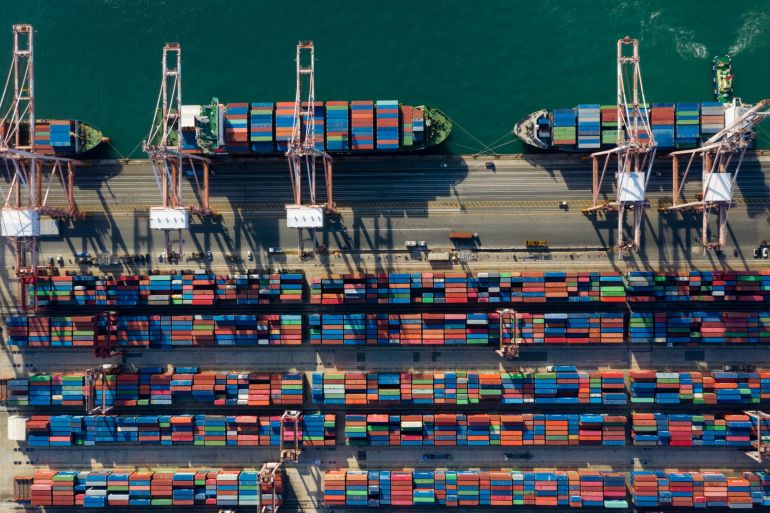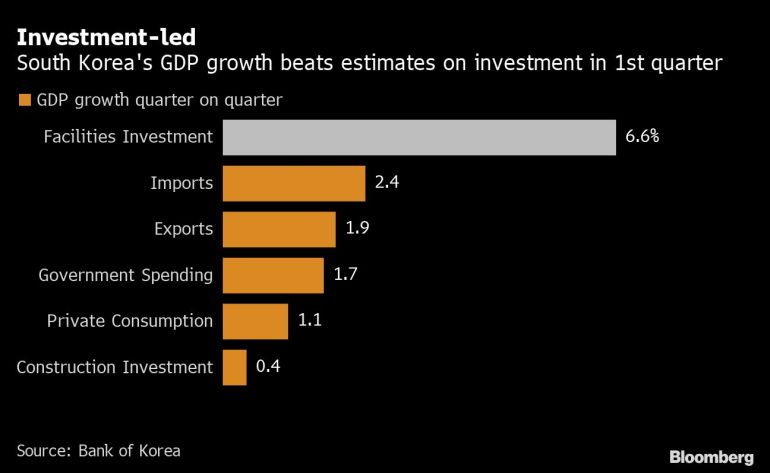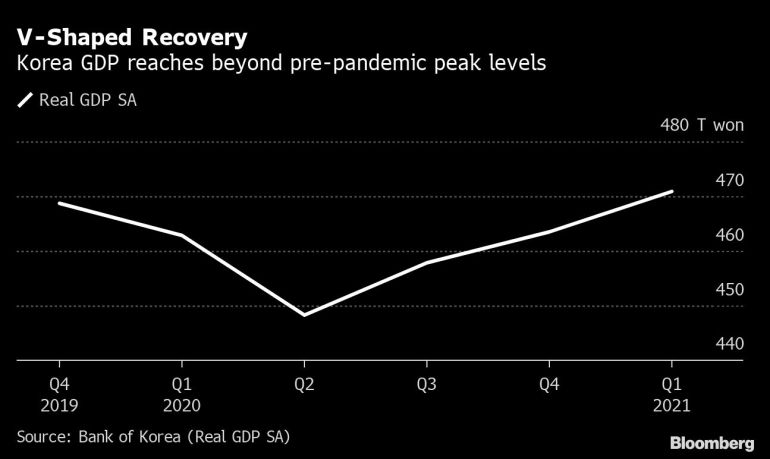South Korea beats virus blues as economy bounces back
Growth in Asia’s fourth-largest economy was driven by exports of chip and electronics and a rise in investments.

South Korea’s economic growth beat expectations in the first quarter, extending the country’s export-led recovery as global demand surged and the government maintained support for ailing small businesses.
Gross domestic product (GDP) grew a seasonally adjusted 1.6 percent in the March quarter from three months earlier, the Bank of Korea (BOK) said on Tuesday, faster than the median estimate of a 1 percent growth rate in a Reuters poll and following a 1.2 percent expansion in the December quarter.
Keep reading
list of 4 itemsSouth Korea ruling party dealt crushing defeats in mayoral polls
Two Korean firms end electric car battery row, averting US ban
South Korea muscles in on global arms trade
Asia’s fourth-largest economy has continued to gain momentum after shrinking 1 percent last year, its worst contraction since 1998, driven by heavy industries such as chip and electronic manufacturing, mostly for exports.
Korea has been one of the better economic performers throughout the pandemic, thanks to strong overseas demand for its products ranging from chips to cars. Investment overtook exports in the first quarter as the key growth driver, with businesses pumping more money into production to take advantage of the accelerating rebound.
GDP expanded 1.8 percent year-on-year in the January-March period after shrinking a revised 1.2 percent three months earlier, also beating an expected expansion of 1.1 percent.
“Economic growth is peaking this quarter and next, and the momentum is driven by strong capital investment and exports, as factories are racing to fill export orders,” said Park Sang-hyun, an economist at Hi Investment & Securities. “Second-quarter growth will be just as strong.”

Underpinning the momentum, Hyundai Motor Co last week posted a near tripling of profit to a four-year high in the first quarter as demand for its luxury cars soared.
Analysts expect profits to also have jumped significantly across South Korean chipmakers such as SK Hynix and Samsung Electronics when they announce first-quarter earnings later this week.
The nation’s finance ministry said it expects the economy to grow slightly faster than 3.2 percent, its earlier projection, as big economies including the United States stage rapid turnarounds and boost demand for Korean exports.
Growth was driven by exports and facility investment, which rose 1.9 percent and 6.6 percent quarter-on-quarter, respectively.
Private consumption grew a slower 1.1 percent on-quarter, after shrinking 1.5 percent in the previous three months.
Fresh downside risks possible
In early April, South Korea stepped up restrictions amid fears of a potential fourth wave of COVID-19 outbreaks, with daily cases hitting three-month highs and the vaccination rate staying at just above 4 percent. The low rate compares with 42 percent in the United States.
The BOK flagged surging coronavirus cases as fresh downside risks to growth earlier this month, though it saw robust exports and a rise in consumption continuing to power the economy.

BOK Governor Lee Ju-yeol said earlier in April that “mid-3 percent” growth was “very possible” this year, up from a previous forecast for 3 percent growth in 2021.
A Reuters poll on Friday showed economists expect South Korea’s economy to expand 3.4 percent this year, its fastest annual growth in 10 years.
The data also follows positive growth reports from China and Singapore, setting the stage for a global rebound. But whether momentum can carry over into the coming quarters hinges on the pandemic. While vaccinations have allowed the virus curve to flatten in some countries, the latest crisis in India suggests no country is immune to sudden flare-ups that put the economy at risk.
Economists have an overall positive outlook but see growing risks from local outbreaks. South Korea has found it more difficult to keep a lid on fresh infections this year and inoculations are yet to start for the broader public. A full recovery in the job market is a way off as social-distancing rules are still restricting the services industry.